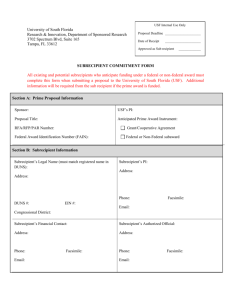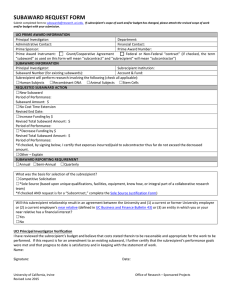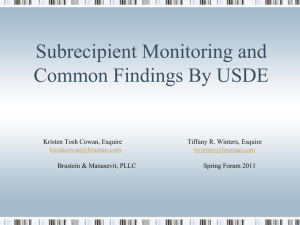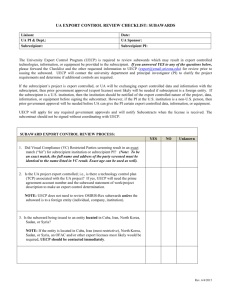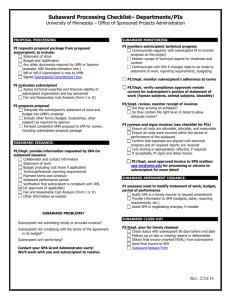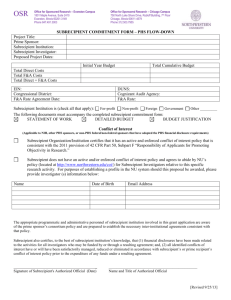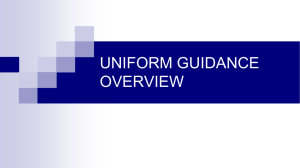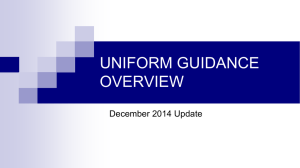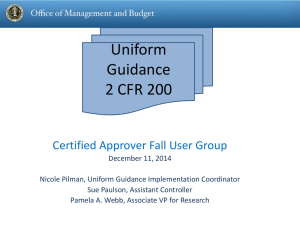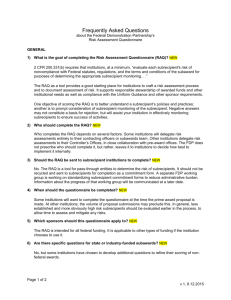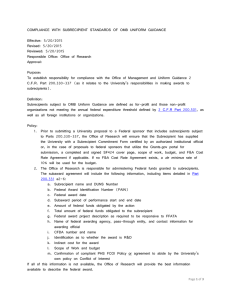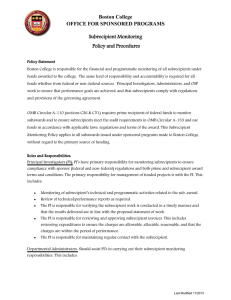Subrecipient (Subaward) Monitoring Guidelines
advertisement
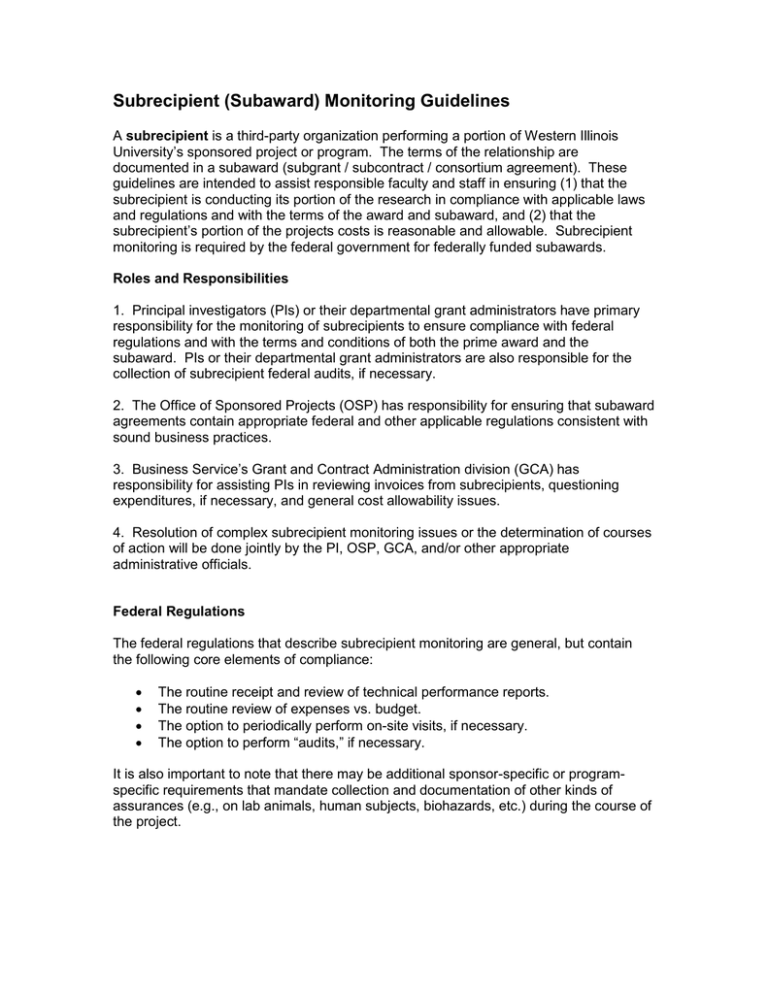
Subrecipient (Subaward) Monitoring Guidelines A subrecipient is a third-party organization performing a portion of Western Illinois University’s sponsored project or program. The terms of the relationship are documented in a subaward (subgrant / subcontract / consortium agreement). These guidelines are intended to assist responsible faculty and staff in ensuring (1) that the subrecipient is conducting its portion of the research in compliance with applicable laws and regulations and with the terms of the award and subaward, and (2) that the subrecipient’s portion of the projects costs is reasonable and allowable. Subrecipient monitoring is required by the federal government for federally funded subawards. Roles and Responsibilities 1. Principal investigators (PIs) or their departmental grant administrators have primary responsibility for the monitoring of subrecipients to ensure compliance with federal regulations and with the terms and conditions of both the prime award and the subaward. PIs or their departmental grant administrators are also responsible for the collection of subrecipient federal audits, if necessary. 2. The Office of Sponsored Projects (OSP) has responsibility for ensuring that subaward agreements contain appropriate federal and other applicable regulations consistent with sound business practices. 3. Business Service’s Grant and Contract Administration division (GCA) has responsibility for assisting PIs in reviewing invoices from subrecipients, questioning expenditures, if necessary, and general cost allowability issues. 4. Resolution of complex subrecipient monitoring issues or the determination of courses of action will be done jointly by the PI, OSP, GCA, and/or other appropriate administrative officials. Federal Regulations The federal regulations that describe subrecipient monitoring are general, but contain the following core elements of compliance: The routine receipt and review of technical performance reports. The routine review of expenses vs. budget. The option to periodically perform on-site visits, if necessary. The option to perform “audits,” if necessary. It is also important to note that there may be additional sponsor-specific or programspecific requirements that mandate collection and documentation of other kinds of assurances (e.g., on lab animals, human subjects, biohazards, etc.) during the course of the project. WIU’s Subrecipient Monitoring Guidelines Certain subrecipient monitoring requirements imposed upon federally funded subawards are set forth in OMB Circular A-133. Verification of the subrecipient’s annual audit must be obtained from each subrecipient whose Federal funding level exceeds $500,000. This is handled by the PI or departmental grant administrator. Additional monitoring activity includes the following: Collection of Technical Performance Reports – Technical Performance Reports should be reviewed and evaluated on a timely basis by the PI, unusual or unforeseen items should be investigated, and reports should be retained on file in the department for ready access by regulators. In some cases, subaward terms may require specified deliverables in addition to, or in lieu of, technical reports. Review of Invoices and Expenses-to-Budget -- For cost-reimbursement subawards, the subrecipient’s invoices showing both current period and cumulative expenses-to-budgets are generally required. PIs (or their departmental administrator) should compare the subrecipient’s invoices to the established subaward budgets. Evidence of the regular review of invoices should be in place and retained on file. “Evidence” can be in the form of PI initials or an authorizing signature on invoices, e-mail communications, etc. Clarification of Invoiced Charges – PIs (or their departmental grant administrator) should request explanations for any “unusual,” “miscellaneous,” “other,” or apparently excessive charges invoiced by the subrecipient. If the explanations received are not sufficient to render a prudent judgment on the allowability of the cost, PIs may request detailed justifications from subrecipients. Examples of detailed justifications that may be requested from subrecipients are: Payroll records / data. Copies of paid invoices showing the cost of items purchased, and Vendor Justification Forms, if required by federal contract. Descriptions of services rendered by consultants, including hourly rates and time reports. Detail of travel charges incurred, stating the purpose, airfare, meals, ground transportation, unallowables, etc. Costs determined to be unallowable or unreasonable should be disallowed. PIs should work with Grants and Contracts Administration to make such determinations. In extreme circumstances where questionable costs remain unsolved, it may be necessary to have an audit conducted. In such situations, PIs should contact GCA and OSP (see Audits, below). On-site Visits – On-site visits are a discretionary monitoring procedure. On-site visits conducted by the PI to evaluate both compliance with the scientific objectives of the project and the appropriateness of the subrecipient’s administrative systems, processes, and charges should be documented via correspondence, meeting notes, trip reports, etc., and retained on file. Audits – Discretionary audits of subrecipients are an acceptable monitoring procedure under federal regulations, and all of WIU’s cost-reimbursement subaward agreements contain “right-to-audit” clauses. Formal audits are performed very infrequently, however, and departments should contact OSP or GCA before proceeding.
